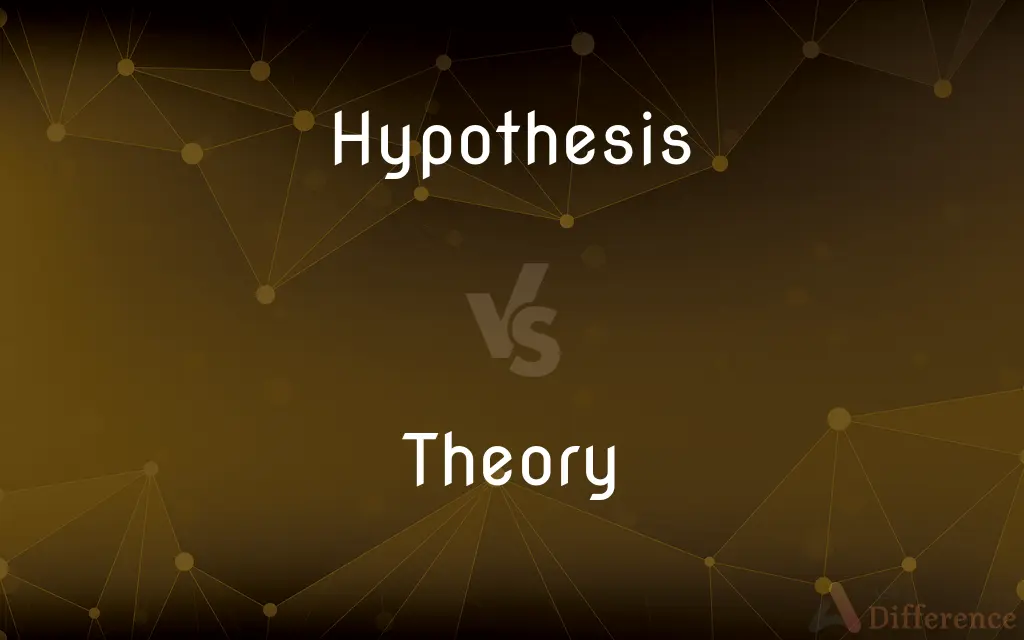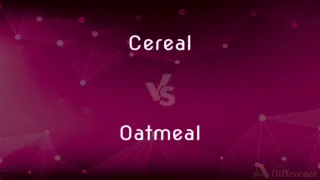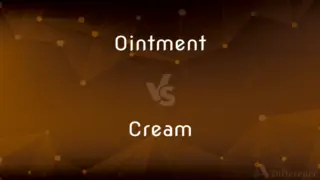Hypothesis vs. Theory — What's the Difference?
Edited by Tayyaba Rehman — By Fiza Rafique — Updated on March 15, 2024
A hypothesis is a proposed explanation based on limited evidence, while a theory is a well-substantiated explanation of some aspect of the natural world.

Difference Between Hypothesis and Theory
Table of Contents
ADVERTISEMENT
Key Differences
A hypothesis is an initial conjecture formulated to explain phenomena, usually based on limited evidence and ready to be tested through experimentation. Whereas, a theory is a comprehensive explanation of an aspect of the natural world, developed through repeated testing and supported by a substantial body of evidence.
While a hypothesis serves as a starting point for investigation, offering a tentative explanation that can be either supported or refuted through research, a theory represents the culmination of that process, synthesizing findings from multiple hypotheses and experiments to construct a coherent model of how things work.
A hypothesis is typically specific and focused, aiming to predict a particular outcome based on certain conditions. On the other hand, a theory is broader in scope, seeking to explain a wide range of phenomena under a unified framework.
The development of a hypothesis often precedes the establishment of a theory in the scientific method. Researchers begin with hypotheses, conduct experiments, and then, based on the outcomes, theories are formulated to explain the observations. Whereas, a theory’s development marks a mature stage in the exploration of a phenomenon, signifying a consensus within the scientific community based on extensive empirical support.
Hypotheses can evolve into theories if the predictions they make are consistently validated by experimental or observational evidence. On the other hand, a theory can stimulate the generation of new hypotheses, pushing the boundaries of knowledge by suggesting areas that require further investigation.
ADVERTISEMENT
Comparison Chart
Definition
A proposed explanation for a phenomenon, based on limited evidence.
A well-substantiated explanation of some aspect of the natural world.
Stage in Research
Preliminary stage, before extensive testing.
Advanced stage, after extensive testing and evidence accumulation.
Scope
Specific, addressing a particular question or prediction.
Broad, explaining a wide range of phenomena.
Evidence Required
Minimal at the outset; needs to be tested.
Substantial, from multiple experiments and observations.
Relationship to Data
Designed to be tested against empirical data.
Supported by a large body of empirical data.
Compare with Definitions
Hypothesis
A message expressing an opinion based on incomplete evidence
Theory
An idea or set of ideas that is intended to explain facts or events.
The germ theory of disease proposes that microorganisms are the cause of many diseases.
Hypothesis
An assumption made for the sake of argument or investigation.
For our experiment, we make the hypothesis that plant growth is directly proportional to the amount of water provided.
Theory
An abstract thought or speculation.
The big bang theory offers an explanation for the early development of the universe.
Hypothesis
A preliminary idea proposed to explain a phenomenon or answer a question.
The scientist offered a hypothesis about the cause of the unusual weather patterns.
Theory
A coherent group of tested general propositions, commonly regarded as correct, that can explain phenomena and predict future occurrences.
Einstein's theory of relativity revolutionized our understanding of space, time, and gravity.
Hypothesis
A proposition put forward as a basis for reasoning, without any assumption of its truth.
The research team proposed a hypothesis regarding the impact of zero gravity on muscle atrophy.
Theory
A well-substantiated explanation acquired through the scientific method and repeatedly tested and confirmed through observation and experimentation.
The theory of evolution by natural selection explains the diversity of life on Earth.
Hypothesis
An educated guess about the relationship between two or more variables.
Our hypothesis is that sleep deprivation negatively affects cognitive performance.
Theory
A body of principles, theorems, or the like, belonging to one subject.
Quantum theory provides a theoretical framework for understanding the physical properties of matter at the smallest scales.
Hypothesis
A hypothesis (plural hypotheses) is a proposed explanation for a phenomenon. For a hypothesis to be a scientific hypothesis, the scientific method requires that one can test it.
Theory
A theory is a rational type of abstract thinking about a phenomenon, or the results of such thinking. The process of contemplative and rational thinking is often associated with such processes as observational study or research.
Hypothesis
A tentative explanation for an observation, phenomenon, or scientific problem that can be tested by further investigation.
Theory
A set of statements or principles devised to explain a group of facts or phenomena, especially one that has been repeatedly tested or is widely accepted and can be used to make predictions about natural phenomena.
Hypothesis
Something taken to be true for the purpose of argument or investigation; an assumption.
Theory
The branch of a science or art consisting of its explanatory statements, accepted principles, and methods of analysis, as opposed to practice
A fine musician who had never studied theory.
Hypothesis
The antecedent of a conditional statement.
Theory
A set of theorems that constitute a systematic view of a branch of mathematics.
Hypothesis
(sciences) Used loosely, a tentative conjecture explaining an observation, phenomenon or scientific problem that can be tested by further observation, investigation and/or experimentation. As a scientific term of art, see the attached quotation. Compare to theory, and quotation given there.
Theory
Abstract reasoning; speculation
A decision based on experience rather than theory.
Hypothesis
(general) An assumption taken to be true for the purpose of argument or investigation.
Theory
A belief or principle that guides action or assists comprehension or judgment
Staked out the house on the theory that criminals usually return to the scene of the crime.
Hypothesis
(grammar) The antecedent of a conditional statement.
Theory
An assumption based on limited information or knowledge; a conjecture.
Hypothesis
A supposition; a proposition or principle which is supposed or taken for granted, in order to draw a conclusion or inference for proof of the point in question; something not proved, but assumed for the purpose of argument, or to account for a fact or an occurrence; as, the hypothesis that head winds detain an overdue steamer.
An hypothesis being a mere supposition, there are no other limits to hypotheses than those of the human imagination.
Theory
A description of an event or system that is considered to be accurate.
Hypothesis
A tentative theory or supposition provisionally adopted to explain certain facts, and to guide in the investigation of others; hence, frequently called a working hypothesis.
Theory
(sciences) A coherent statement or set of ideas that explains observed facts or phenomena and correctly predicts new facts or phenomena not previously observed, or which sets out the laws and principles of something known or observed; a hypothesis confirmed by observation, experiment etc.
Hypothesis
A proposal intended to explain certain facts or observations
Theory
(uncountable) The underlying principles or methods of a given technical skill, art etc., as opposed to its practice.
Hypothesis
A tentative theory about the natural world; a concept that is not yet verified but that if true would explain certain facts or phenomena;
A scientific hypothesis that survives experimental testing becomes a scientific theory
He proposed a fresh theory of alkalis that later was accepted in chemical practices
Theory
(mathematics) A field of study attempting to exhaustively describe a particular class of constructs.
Knot theory classifies the mappings of a circle into 3-space.
Theory
A hypothesis or conjecture.
Theory
A set of axioms together with all statements derivable from them; or, a set of statements which are deductively closed. Equivalently, a formal language plus a set of axioms (from which can then be derived theorems). The statements may be required to all be bound (i.e., to have no free variables).
A theory is consistent if it has a model.
Theory
A doctrine, or scheme of things, which terminates in speculation or contemplation, without a view to practice; hypothesis; speculation.
Theory
An exposition of the general or abstract principles of any science; as, the theory of music.
Theory
The science, as distinguished from the art; as, the theory and practice of medicine.
Theory
The philosophical explanation of phenomena, either physical or moral; as, Lavoisier's theory of combustion; Adam Smith's theory of moral sentiments.
Theory
A well-substantiated explanation of some aspect of the natural world; an organized system of accepted knowledge that applies in a variety of circumstances to explain a specific set of phenomena;
Theories can incorporate facts and laws and tested hypotheses
True in fact and theory
Theory
A tentative theory about the natural world; a concept that is not yet verified but that if true would explain certain facts or phenomena;
A scientific hypothesis that survives experimental testing becomes a scientific theory
He proposed a fresh theory of alkalis that later was accepted in chemical practices
Theory
A belief that can guide behavior;
The architect has a theory that more is less
They killed him on the theory that dead men tell no tales
Common Curiosities
How does a hypothesis differ from a theory?
A hypothesis is an initial, testable proposition, while a theory is a substantiated explanation developed after extensive testing.
Can a hypothesis become a theory?
Yes, a hypothesis can evolve into a theory if it is consistently supported by experimental evidence and scientific analysis.
Can a theory be disproven?
Yes, theories can be modified or refuted if new evidence emerges that contradicts the current understanding.
Is a theory the same as a law?
No, a law describes what happens under certain conditions but does not explain why, whereas a theory explains the reasons behind the observed phenomena.
Do all hypotheses lead to theories?
Not all hypotheses become theories; only those that are extensively tested and consistently supported by evidence may evolve into theories.
What is a theory?
A theory is a well-substantiated explanation of some aspect of the natural world, based on a body of facts that have been repeatedly confirmed through observation and experimentation.
Why is a hypothesis important in science?
It serves as a foundation for designing experiments and testing the validity of predictions, guiding scientific inquiry.
What is an example of a hypothesis turning into a theory?
The hypothesis of atoms existing was eventually supported by extensive evidence, leading to the development of atomic theory.
What is a hypothesis?
A hypothesis is a proposed explanation for a phenomenon, made as a starting point for further investigation.
How is a theory developed?
Through the accumulation and synthesis of evidence from multiple observations, experiments, and validated hypotheses.
What role do theories play in science?
Theories provide comprehensive explanations of natural phenomena, guide further research, and predict future observations.
What evidence is required for a theory?
A theory requires substantial evidence from a wide range of experiments, observations, and consistent validation.
How do hypotheses and theories contribute to scientific knowledge?
They are critical for advancing scientific understanding, with hypotheses offering initial insights and theories providing broad, substantiated explanations.
How specific is a hypothesis?
A hypothesis is usually specific, proposing a testable relationship between variables for a particular scenario.
Are theories final and unchangeable?
Theories are not final; they can be refined or replaced as new evidence emerges and scientific understanding evolves.
Share Your Discovery

Previous Comparison
Cereal vs. Oatmeal
Next Comparison
Ointment vs. CreamAuthor Spotlight
Written by
Fiza RafiqueFiza Rafique is a skilled content writer at AskDifference.com, where she meticulously refines and enhances written pieces. Drawing from her vast editorial expertise, Fiza ensures clarity, accuracy, and precision in every article. Passionate about language, she continually seeks to elevate the quality of content for readers worldwide.
Edited by
Tayyaba RehmanTayyaba Rehman is a distinguished writer, currently serving as a primary contributor to askdifference.com. As a researcher in semantics and etymology, Tayyaba's passion for the complexity of languages and their distinctions has found a perfect home on the platform. Tayyaba delves into the intricacies of language, distinguishing between commonly confused words and phrases, thereby providing clarity for readers worldwide.














































